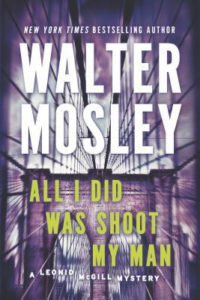 All I Did Was Shoot My Man was my first introduction to Walter Mosley’s dubiously honest and morally compromised private investigator, Leonid McGill.
All I Did Was Shoot My Man was my first introduction to Walter Mosley’s dubiously honest and morally compromised private investigator, Leonid McGill.
McGill is not all that likable: his life and morals are a mess. (McGill is often hired to plant false evidence on a person to twist the rightfully accused out of his dilemma.) Nevertheless, I stuck with him through the mystery.
The story was also messy, complicated to follow with many intertwining characters, from McGill and his family to villians and competing police. When I got to the end and found out whodunit, I didn’t really know why or really care all that much, but the story was over, so that worked for me.
And then, in a subplot, instead of McGill meeting his estranged father, an American Communist revolutionary, for the first time in 40 years, we find that his estranged wife attempts suicide in their apartment bathroom. It’s messy too.
I did enjoy Mosley’s prose; he’s quite the wordsmith. Being fond of dialogue driven crime fiction, Mosley also appealed to me with his character’s often succinct and minimalist delivery. Alternatively, his character descriptions can b verbose, not leaving much to the imagination, but not always. When these qualities are combined, you get something like a “a large man with porcine eyes.” Porcine? Pig-like, meaning small and narrow. I’ll remember that for my own writing.
Would I read another McGill story? Maybe, as long as I can get the book on the cheap. But when have I ever bought a book at full price?
Story Summary (from the publisher):
Zella Grisham never denied shooting her boyfriend. That’s not why she did eight years of hard time on a sixteen-year sentence. It’s that the shooting inadvertently led to charges of grand theft. Talk about bad luck. Leonid McGill has reasons to believe she’s innocent. But reopening the case is only serving to unsettle McGill’s private life even further—and expose a family secret that’s like a kick to the gut. As the case unfolds, as the truth of what happened eight years ago becomes more damning and more complex than anyone dreamed, McGill and Zella realize that everyone is guilty of something, and that sometimes the sins of the past can be too damaging to ever forget. Or ever forgive.
